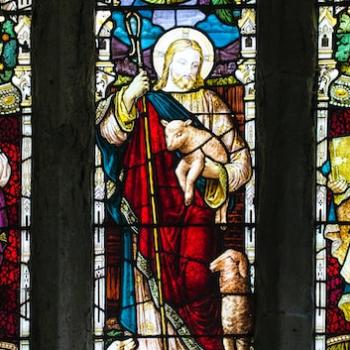The fourth Sunday in Easter opens the door to what it means to have the fullness of life. In other words, it’s the GOAT on the gate.

My best friend from college has lived in lots of different places. Her bachelor’s, master’s, and Ph.D. degrees were earned in a geographically diverse array of U.S. cities. Each one involved numerous apartment leases, moving companies, change-of-address forms, and questionable roommates. After marriage, she and her husband lived on the west coast for a while before moving to Paris, France, for a couple of years. They are now back in the States with kids ready to begin their own geographically diverse journeys into higher education—and questionable roommates.
Something I have loved about visiting my friend wherever she lives in her “collection of doors.” She has framed a black-and-white photo of each door to the apartment/condo/house/wigwam in which she has lived and arranged them into a wall display in her current abode. I find it captivating.
Looking at it feels like adding soda to the Mentos in my gut . . . but nicely. It fizzes and bubbles over in a gentle, non-four-alarm-fire kind of way. It prickles and tickles. It makes me pay attention because the doors seem to have something to say.
Gates and Doors
During Cycle A, the gospel reading for the fourth Sunday of Easter is about the “gate” that the Good Shepherd offers to his sheep. During B, it’s the passage right after A that further talks about the Good Shepherd, and during C, the brief reading is about the importance of belief.
Gates are more like doors than they are windows. You don’t go through windows . . . unless you are on the first floor, and her parents got home much earlier than expected. Or you’re on a higher floor, and your, well, high. Very little good comes from going through a window.
But doors and gates . . . . they are another story altogether. They are beautiful, alluring things. They cast a spell. We are invited to go through them to become something new, something different on the other side. What could be cooler than that?
Jesus says, “I am the gate. Whoever enters through me will be saved….” (John 10:9). Without a doubt, Jesus invites us to go through him to become something new, something different.
From Here to There
Presumably, this verse means that to “have life and have it more abundantly” (10), we must “believe in Jesus.” But what do we really mean when we speak of believing in Jesus? What exactly does that involve?
Throughout the history of Christianity, the primary answer that has surfaced is that believing in Jesus means cognitive assent to and willingly assertion that Jesus is God’s only son sent to save us from sin. That could probably serve as a dictionary definition for Christianity. It’s too long for a bumper sticker.
I’m reminded of a movie I saw years ago where an avowed atheist refused to believe not only in Jesus but in any kind of God. That is until he got run over by a car. In the 90 seconds or so before he died, he said that he did believe that Jesus was his personal Lord and savior. As the organ swelled and the violins played, nearby characters heard his profession and were relieved that he was now saved and going to heaven. Praise Jesus!
Really?
Fr. Richard Rohr has pointed out repeatedly in his writings that equating “belief” with “cognitive assent” may not be the complete picture. I’ve written before that I can’t accept the “substitutionary atonement theory” of salvation for several reasons. I’m not alone. Many have left the Church because the magical language of the early Church during the Classical Period no longer makes sense in the modern world today.
But there is a way to understand “belief” as following the teachings of. Throughout the gospels, Jesus’ disciples address him as “teacher” and “rabbi.” Perhaps believing in Jesus isn’t so much about the mental gymnastics needed to align ancient truths in archaic language with what we know about the world today. Maybe it’s more about living the way Jesus taught us to live. To paraphrase Jesus himself: There are only two commandments. Love God and love neighbor. (Matt. 22:37-39). Mic drop.
One could argue, “Then you’re saying Jesus is just any other human, any other teacher, not God!” I would counter that argument by questioning the definitions of our terms. I see nothing in the paragraph above that calls Jesus’ “divinity” into question if we are clear on what that word really means.
Opening New Doors
Jesus is the gate – the door – through which an abundant life becomes possible. When you love without condition, forgive without grievance, serve without resentment, and give without keeping track, life has a way of expanding like the known universe and credit card debt. Somehow, even when there’s pain and failure, there’s even more substance, even more connection. I don’t know how it works, only that it does.
When I think of my friend’s collection of framed doors, I think of the great abundance in life that awaited her on the other side of each one. And that makes me think of my own doors, however lacking in photographic adornment they are. What Jesus came to teach us in word and deed is the door we go through to become something more, something beautiful on the other side.












